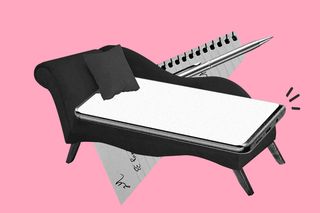
Work, Re‑cultured: The 30‑Year‑Old Psychiatrist Building an Online Private Practice
“I also nod my head more, figure out more ways to illustrate ‘I’m here’ and ‘I’m listening,’ especially because eye contact is not super clear on video calls.”

In Work, Re-cultured, The Swaddle brings you a snapshot of what work-from-home culture looks like for Indian professionals across industries. In this installment, a 30-year-old psychiatrist, Dr. Dev.
I was working in Pune for five years, initially as a post-graduate student and then an assistant professor in a medical college. My work hours were 9 a.m. to 4 p.m., seeing patients in OPD. I hardly ever worked in the evenings.
I was going to leave that job and move to Hyderabad. The pandemic quickened that process for me. Before the pandemic, I hadn’t thought about taking my practice private. But March onwards, I started getting calls from friends, and friends of friends, about anxiety. I’m usually lazy with my social media account, but I put up one post on Instagram saying I’m open to online consultations. In the beginning, I wasn’t very keen on it — you’re so used to face to face. It’s so much better if the person is with you in the room. But obviously when people reached out, I thought I should help. I started with 4-5 per week, one session each day, lasting 45 minutes. The clients speak quite a bit, and I also tend to ramble. It was a very new experience.
The thing is: we don’t have that physical touch as a psychiatrist; we may put a hand on the patient’s hand when they are having a tough moment. But it’s more about sharing a common physical space. There are so many technicalities — if I can’t see their face or their body language right from their feet to their head, then it makes my job difficult. To be able to detect differences in the tone of a patient’s voice, to showing them that I am empathizing with them, to be able to gauge if anything feels off — these things are easier to do in person. That’s the part that gets difficult online.
It’s not something we prefer, but it does work. The pros are that I did talk to a lot of patients who are in different cities. Now I’m starting to think doing online consultation is not a very bad thing (as I used to think before). That has changed — now, the patients are okay with it and the doctors are pushing for it, at least until this pandemic ebbs away.
For me, I sometimes forget about the time, how long the session is running. It’s also a little more difficult to cut the interview short, to traverse that boundary online. And when you are working as a team in the medical college, if by chance the patient fit is not that good, I can always transfer the patient to another doctor. Now that has become tricky. For example, I am finding a couple I’m working with difficult. I’m new to couples counseling. Before the pandemic, I could just speak to my colleagues about it. But being an individual psychiatrist in a new city, I don’t have many options. I have started talking to some new people I have found in the profession who discuss cases on Zoom calls, so now I’m feeling like I have a support system.
I’m myself doing online sessions with my therapist too. It gives me a bit of that feeling of being on the other side of the table. I know how it feels to be vulnerable, to open up to a new person, a stranger, which is helping me do my job. I’m also struggling with bringing work home. Before, I used to work at work, and then leave it there. Now, all of us are trying to make space for it at home. It’s a mental shift, when you shift space.
For example, I’m very aware of what my patient can see of my background. It’s a decision — what you want to hide, what you want to reveal. I also nod my head more, figure out more ways to illustrate ‘I’m here’ and ‘I’m listening,’ especially because eye contact is not super clear on video calls.
Medication has also become a bit of a problem. When patients used to come to the clinic, we could encourage them to bring someone with them. Now, it especially becomes a problem when they live alone, to stress getting their relatives’ numbers, explain it to their friends or loved ones, who can help them stay on track with their medication. In the first few weeks of the pandemic, we also didn’t have much clarity on if the photo prescriptions would be valid. But now I see that pharmacies are giving out prescriptions very liberally, worth months of medication even if the prescription says 15 days.
Because of this lack of control, I’ve become more strict about the prescriptions I write, and have tried suggesting alternatives, like hygiene measures. It’s a little scary.
It’s time we accepted this. You can’t help it, you have to accept it and go along with it. I’m just telling myself and suggesting others to keep their hours spaced. That’s all.
As told to Rajvi Desai.
Related


Work, Re‑cultured: A Start‑Up Employee Finds an Already‑Bad Work Culture Got Worse
